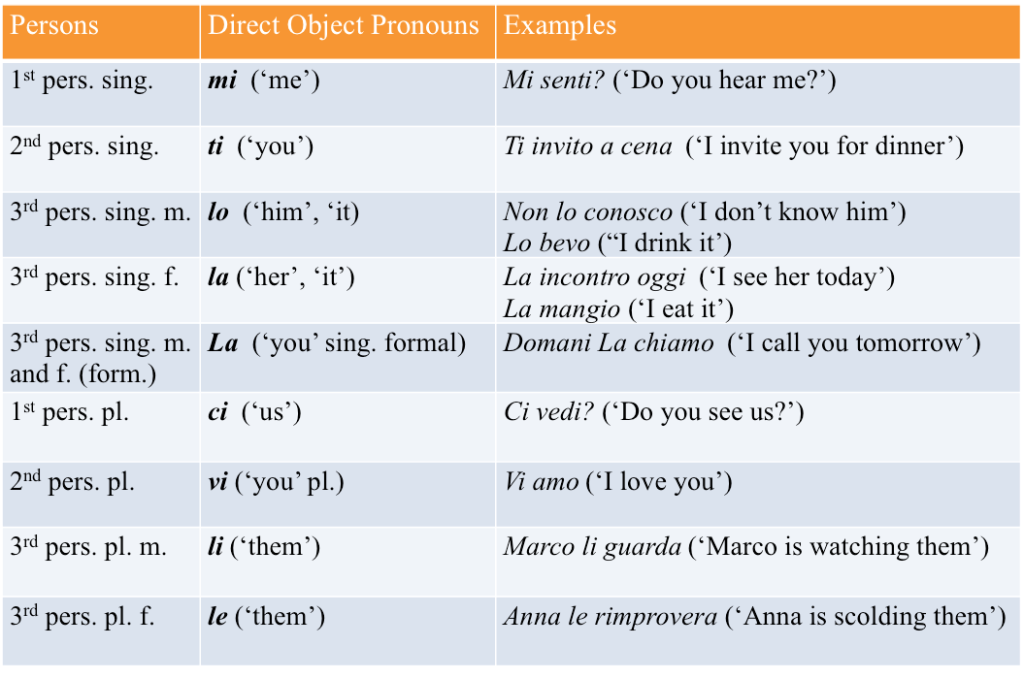Direct Object Pronouns

A direct object is a noun which receives the action of a verb directly, without a preposition: Mangio la pizza (I eat pizza), Oggi incontro Antonio (Today I meet Antonio). It answers the question Che cosa? (What?) or Chi? (Who?). A direct object pronoun is used to replace a direct object noun especially in order to avoid repetition. For instance, in Oggi vedo Marco, lo incontro in biblioteca (‘I will see Marco today; I will meet him in the library’), the pronoun lo (‘him’) replaces Marco.
The table below displays the direct object pronouns, their English equivalents, and a sample of their use

- the direct object pronouns (mi, ti, lo, etc.) work like the reflexive pronouns, so they come directly before the verb (Lo chiamo ‘I call him’, L’ho visto ‘I saw it’, Ti amavo ‘I was in love with you’) or they attach to the infinitive verb form after this has dropped its final –e (Penso di conoscerti ‘I think I know you’, Vai a incontrarlo ‘Go to meet him). If the infinitive follows potere (‘can’), dovere (‘must’) and volere (‘to want’), the pronoun may either attach to the infinitive (Posso/Devo/Voglio conoscerti ‘I can/must/want to know you’) or precede the entire verb phrase (Ti posso/devo/voglio conoscere ‘I can/must/want to know you’);
- the singular pronouns lo, la, but never the plural li and le, can elide (l’) in front of verbs that begin with a vowel: L’ammiro (‘I admire him’);
- in a negative sentence, the word non must come before the unstressed object pronouns (Non ti amo ‘I don’t love you’);
- la and lo, li and le can also refer to animals and objects, so they can also mean ‘it’ and ‘them’ neuter: Carlo legge un libro > Carlo lo legge (‘Carlo reads a book > Carlo read it’), Milena mangia una mela > Milena la mangia (‘Milena eats an apple > Milena eats it’), Noi amiamo gli animali > Noi li amiamo (‘We love animals > We love them’), Io scrivo lettere > Io le scrivo (‘I write letters > I write them’);
- the pronoun lo can also refer to an entire sentence: Sai che presto vado in Italia? – Si, lo so (‘Do you know that I am going to Italy soon? – Yes, I know it’). The pronoun lo (‘it’) replaces in this case the entire phrase che presto vado in Italia;
- as you know the word ecco means ‘here/there is’: Ecco Giovanna (‘Here is Giovanna’), Ecco il libro (‘Here is the book’). When ecco is used with a direct object pronoun rather than a noun, the pronoun is always attached to ecco: Eccomi (‘Here I am’), Eccoti (‘Here you are’).

![]() Replace the direct object nouns (it answers the questions ‘Who?’/ ‘What?’) with the correct direct object pronouns
Replace the direct object nouns (it answers the questions ‘Who?’/ ‘What?’) with the correct direct object pronouns
![]()
Accompagno mia figlia a scuola tutti i giorni.
Non mangio mai la frutta dopo cena.
Elena scrive una lettera.
Porto sempre una penna con me.
Domani finalmente compro il computer.
Oggi incontro i tuoi amici in piazza.
![]() Based on the context, use the correct direct object pronouns
Based on the context, use the correct direct object pronouns ![]()
Scrivo una lettera e te mando subito.
Signora Rossi, ascolto con attenzione.
Prendiamo dei dolci e portiamo a Alfredo
Il bambino compra un gelato e mangia subito.
Quando parli in Italiano, tutti capiscono benissimo.
Sciviamo degli auguri e mandiamo alla nonna.
La mamma compra il giornale ogni giorno, ma non legge mai.
I miei amici americani partono fra un’ora e io voglio salutare.
E’ vero, viviamo lontano, ma tu non vieni mai a trovare.
![]() Fill in each blank with the correct form of the direct object pronouns attached to the infinitive
Fill in each blank with the correct form of the direct object pronouns attached to the infinitive ![]()
Non c’erano mele al mercato oggi. Purtroppo oggi non possiamo mangiar.
Carla non ha il cellulare. Non posso chiamar.
Vedi quel libro? Può prender, per favore?
Tua mamma è appena arrivata; vai a salutar.
Sono qui! Puoi veder?
Professore, Lei è libero domani? Posso venire a parlar?
Tutti dicono che quel film è bellissimo. Dobbiamo veder.
![]() Translate into Italian the following sentences
Translate into Italian the following sentences
Do you like cats? I love them.
I like ice cream. I eat it every day.
I can’t hear you. Can you tell me your name?
Mary has a big dog. She adores him.
When you call me?
Where are you? I can’t see you!
My mum loves my brother and me. She loves us.
Here she is.
![]() &
& ![]() A TV commercial: Publiacqua
A TV commercial: Publiacqua
Protagonista dello spot pubblicitario è l’acqua. Che cosa dobbiamo fare dell’acqua secondo Leonardo? Leonardo usa alcune volta il pronome ‘la‘ riferito all’acqua ed una volta il pronome ‘lo‘ per sostituire un’intera frase. Puoi riconoscerli? ![]()
